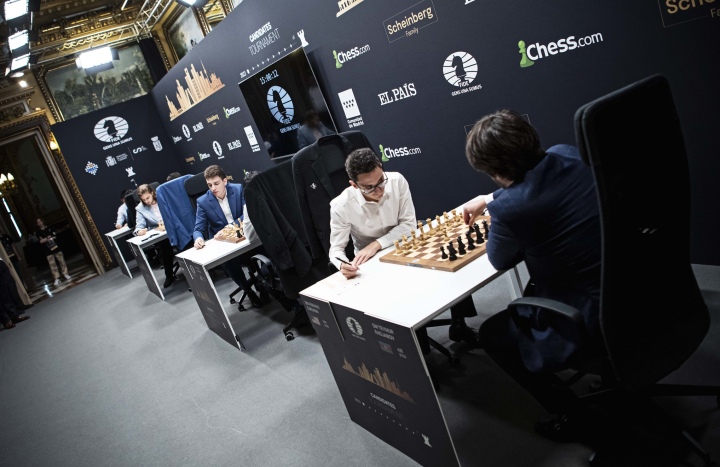
As the tournament reached its halfway point, Ian Nepomniachtchi and Fabiano Caruana are again(!) the only two players to score victories, significantly distancing themselves from the rest of the field
With half of the tournament in Madrid played, Ian Nepomniachtchi is alone in the lead with 5.5/7. The former challenger for the world chess crown is on the path of repeating his 2020/21 victory in the Candidates, where he secured a leadership position early on and kept it until the end of the tournament. Right behind him, by half a step, is another former winner of the Candidates and challenger, Fabiano Caruana, who has five points. The two have now distinguished themselves from the rest of the field.
Behind them, on fifty percent, is Hikaru Nakamura. The lower part of the board is made up of three players on three points: Jan-Krzysztof Duda, Ding Liren and Richard Rapport. At the bottom of the table are the oldest and the youngest players in this year’s Candidates: Teimour Radjabov and Alireza Firouzja, who both have 2.5 points.

The halfway point of the 2022 Candidates saw Ian Nepomniachtchi score a confident victory against Richard Rapport. In the Petrov, Rapport walked directly into Nepomniachtchi’s preparation – a forced, sharp line leading to a quick draw. It seemed that Rapport had no choice but to accept a quick draw following a repetition of moves, but – to the surprise of many – he decided to play on, despite the odds stacked against him. What occurred was a battle where Rapport had two rooks for a queen, but his king was exposed. In a sharp and wild position, White wasn’t without chances, but, despite Rapport’s heroic efforts, Nepomniachtchi made sure nothing came of them.
Despite the loss, Rapport deserves praise. Many chess pundits who were following the game said that Rapport’s decision to decline an early draw and enter a weaker and riskier position instead was unnecessary and that he should have accepted reality. That may be objectively true, however, it is exactly those who refuse to accept (a dim) reality that stands a chance to make a difference and sometimes manage to do it. Rapport has shown that he is here to fight whatever the odds and throw a good show for the audience, the people who love chess. From a wider perspective, chess was granted another interesting story to tell, which goes beyond the standard reciting of lines and is much more about psychology, courage and character. A rare exception to dull and quick theoretical draws, which – however realistic – make the game less attractive for everyone.

The second victor of the day was Fabiano Caruana, who defeated Teimour Radjabov. The game got off to a better start for Radjabov, who seemed to have surprised Caruana with a rarer variation of the Sicilian, playing 2…a6 and then following the line with e5 and d5. Caruana seemed somewhat uncomfortable as Radjabov was blitzing his moves. However, when the dust settled, it turned out that Caruana was a pawn up with more initiative. He calmly proceeded to grind Black’s position, entering a sharp but winning rook endgame. Radjabov – an expert in finding a way to a draw – was trying every trick on the board. Both sides promoted queens in the endgame, but it was of no help for Black. Once the second pair of queens was exchanged, it finally became apparent to Radjabov that Caruana would be quicker in promoting his third queen. After nearly seven hours of play, Radjabov accepted defeat.
The other two games in the seventh round were calmer.
Jan-Krzysztof Duda and Hikaru Nakamura split a point in the Nimzo-Indian. Despite having somewhat more initiative, the game was mostly balanced throughout. All White’s attempts to get things going were skillfully thwarted by Black. Next to Nepomniachtchi and Caruana – Nakamura is the only other player in the Candidates who has so far had a victory. However, since his comeback in round two following a loss on day one, the world’s top chess streamer is struggling to make a break past fifty percent. It remains to be seen which way he will go in the second part of the tournament. As for Duda – he has been very constant in his level of play in the first seven rounds. If he keeps it up, results will surely follow.
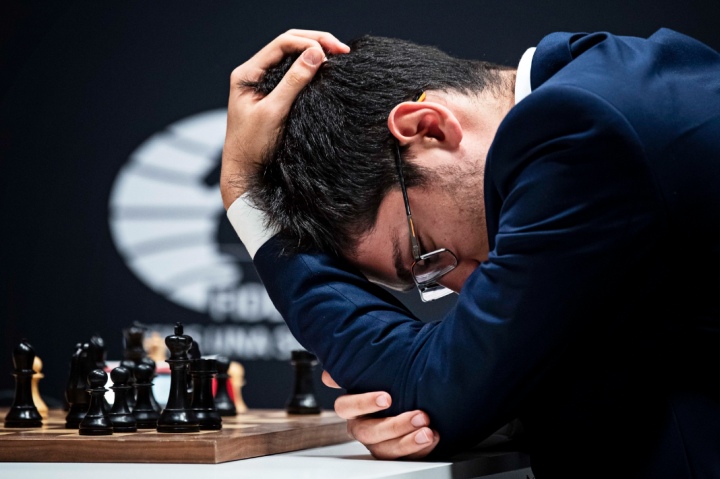
Both Ding Liren and Alireza Firouzja were players for whom many had great expectations before the start of the tournament. But so far, both have seriously struggled and, at the bottom of the board, are desperate for a breakthrough. However, neither managed to make to step forward today. In the English opening, Firouzja achieved a dynamic position, favouring his style of play. Ding, leading white pieces, played very solidly – both creating chances and countering Firouzja’s attempts to break free. Like in the previous games, the Frenchman spent much more time thinking, trying to find the magic spark to let his creativity run free, but without success. With 2.5/7, Firouzja is at the bottom of the table where he is now joined by Teimour Radjabov, whom he will be facing in the eighth round, while Ding Liren has three points.
Here follows a closer look at the games from round seven of the Candidates.
Richard Rapport vs Ian Nepomniachtchi: The victor and the hero
Es heißt, dass das Glück den Mutigen begünstigt, aber in der heutigen Partie zwischen Rapport und Nepomniachtchi war das nicht der Fall. In ihren vorherigen Begegnungen haben sie acht Mal unentschieden gespielt, mit einem Sieg für Rapport. Nach sechs hart umkämpften Unentschieden hätte Rapport das Kandidatenturnier in dieser Partie weit öffnen können.
Wie in seiner Partie in Runde 5 antwortete Nepomniachtchi mit einem Petrov. Es wurde eine extrem scharfe, aber erzwungene Linie gespielt, bei der Rapport direkt in Nepomniachtchis Vorbereitung lief.
Weiß beendete einen Turm im Zug 14, aber Schwarz hatte ernsthafte Mattdrohungen.
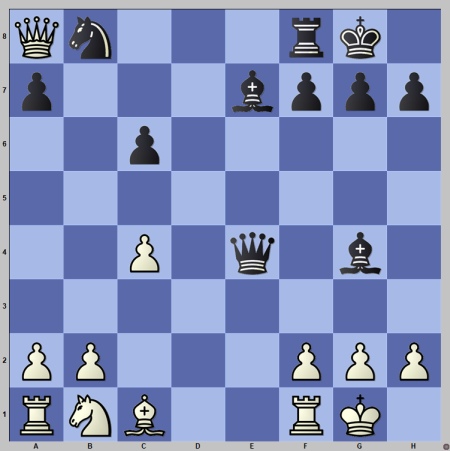
Nach 14…Lh3 15.gxh3 Dg6+ 16.Kh1 De4+ 17. Kg1 Dg6+ 18.Kh1 De4+ verbrachte Rapport viel Zeit mit dem Nachdenken – Remis per Perpetual anstreben oder nach einem Ausweg suchen. Aber sich für 19.f3 statt 19.Kg1 zu entscheiden, bedeutete, in eine sehr komplizierte Stellung einzutreten, in der – laut Computer – Weiß trotz eines Turms schwächer ist!
Hand in den Kopf, verbrachte Rapport viel Zeit mit Nachdenken. Seine Stimmung war an seinen Gesichtsausdrücken ablesbar – von sehr unglücklich, fast ärgerlich über die Position, über das Herumrutschen auf seinem Stuhl, den Blick in der Halle bis hin zum Starren auf die Tafel. Nach fast einer halben Stunde Bedenkzeit entschied er sich für 19.f3. Eine große Überraschung. Rapport zeigte, dass er kämpfen wollte. In der Zwischenzeit ging Nepomniachtchi im Flur auf und ab.
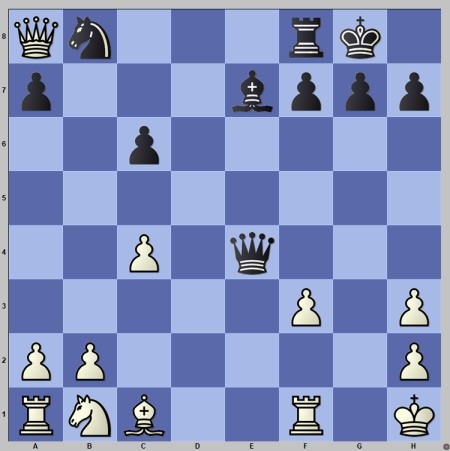
After 19…Qd3 20.Kg2 Qg6+ 21. Kh1 Qd3 Rapport turned down a draw again and entered directly a position in which he was – according to the computer – significantly worse. By move 24. White exchanged his queen for two rooks, and we had the following position on the board:
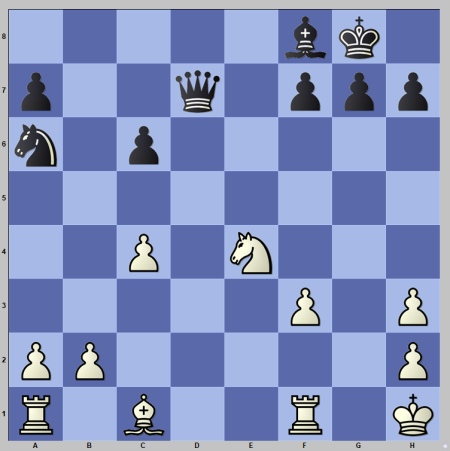
Despite the material equilibrium, White had a ruined pawn structure on the kingside with his king dangerously exposed. To make things even worse, Rapport did not make the most precise moves.
Nepomniachtchi, on the other hand, was playing fast – he brought in his knight from the edge of the left flank back into action on the kingside, advanced his h-pawn and started coordinating an attack. Rapport responded by advancing his queenside pawns and threatening Black’s hanging a- and c- pawns.
Black executed his attack swiftly and sharply. Following the exchange of knights, he asserted complete dominance over the board.
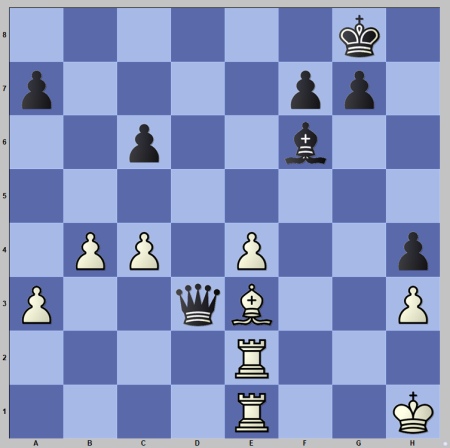
White was completely paralyzed. With 40.Bxa7, he gave up the last remaining pawn protecting his monarch, and Black started weaving a mating net around the opponent’s king while advancing his h-pawn towards promotion.
After three hours of play, Rapport resigned. This game was the first to finish. The victory left Nepomniachtchi as the sole leader with 5.5/7.

Rapport paid the price of not being well versed in opening preparation. Nepomniachtchi managed to impose a sharp but forced draw as Black. A wasted opportunity for Rapport and a convincing victory by Nepomniachtchi. Rapport, who could have had seven draws and be in the middle, is now in the lower part of the table, with three points. As for Nepomniachtchi, he achieved a big victory, almost entirely thanks to his home preparation and not having to come up with much on the board.
Jan-Krzysztof Duda vs Hikaru Nakamura: The (im)perfect rebound
It was a dangerous game for Duda: he was up against one of the most experienced and strongest world players. Following a loss to Nepomniachtchi, Duda might have been tempted to pressure as white, but he had to be careful not to over-force it.

In the Nimzo-Indian, White entered a variation with an isolated pawn on d4. It seems that Duda was more prepared for the opening line than Nakamura, who spent some time thinking about the moves in the first part of the game.
After trading a couple of minor pieces on d5 and getting rid of his isolated pawn, White got a slight edge and potentially a very promising with a ‚good‘ knight against a ‚bad‘ bishop. At this point, many thought that Nakamura was heading for a positional uphill battle.
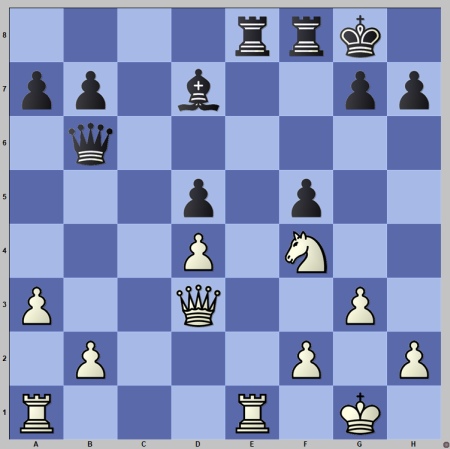
However, after a precise 19…Re4! by Nakamura, it just did not work out for White in concrete tempo for tempo variations. White’s position still looked very attractive but offered hardly anything more as Black had everything covered.
The game eventually liquidated into an even rook endgame where the two players agreed on a draw.
Ding Liren vs Alireza Firouzja: The struggle continues
It was a duel between the two players whose struggle is most obvious in this tournament.
Ding’s mojo is almost there; he has been very close to winning against Rapport or Radjabov in the previous rounds. Firouzja, on the other hand, is struggling to find a way to impose positions he likes, which has affected his result.
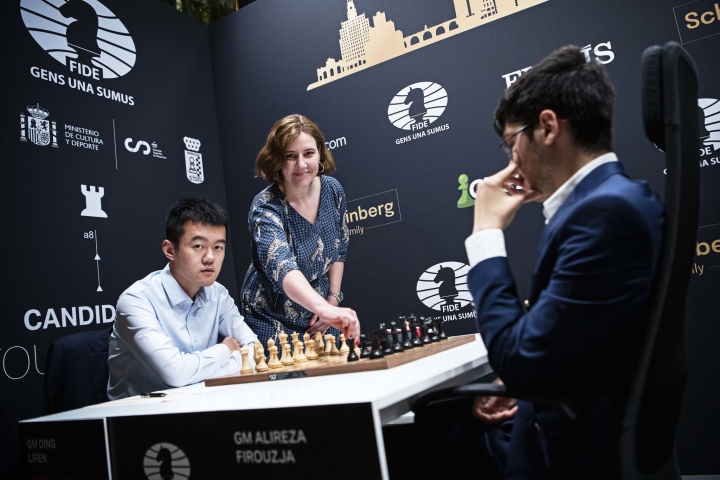
The English opening was played. Both players secured their kings early on, and then the play concentrated more on the queenside, where Firouzja was pushing his a-pawn from early on. A dynamic and unbalanced position was developing – which is supposed to favour Firouzja’s style of play.
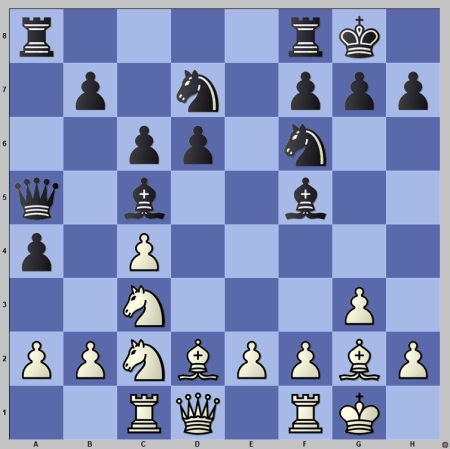
In this position, Firouzja spent 48 minutes thinking about his next move and decided to go 13…Qa7. Chess engines prefered 13…Rfe8, but it was still a good position for Black. However – as in previous games – Firouzja was entering time trouble.
Ding played very solidly, and following the exchanges in the centre, the opponents ended up in an equal position in which neither had a feasible plan of pressing for a win. Firouzja managed to create a runner on the b-file in a rook and knight endgame, but Ding was active enough to counter any chances for Black to get his king to the centre of the action.
Black pressed on, playing on both sides of the board, but white managed to counter every attempt for a breakthrough, and both had to come to terms with a draw.
Fabiano Caruana vs Teimour Radjabov: Smoke and mirrors
Caruana and Radjabov are on opposite trajectories in Madrid: While the first is a step behind the leader, Radjabov is half a step away from the bottom. Before the game, Caruana (who is coached by Vladimir Chuchelov, who once coached Radjabov) had a 4:0 record against his opponent.

However, the game started with a surprise as Radjabov stunned Caruana in the opening. In the Sicilian, Teimour played a somewhat surprising move 2…a6, hoping to unsettle Caruana. It was now Caruana who had his own surprise – spending nine minutes thinking on the move three! He played 3.c4, to which Radjabov responded with 3…Nc6, which was followed by 4.d4 cxd4 5.Nd4 e5. At this moment, again, Caruana spent a lot of time (16 minutes) thinking before he moved the knight to f5. In contrast to Caruana, Radjabov was blitzing the moves, including 6…d5, temporarily giving up a pawn, which he played in 24 seconds.
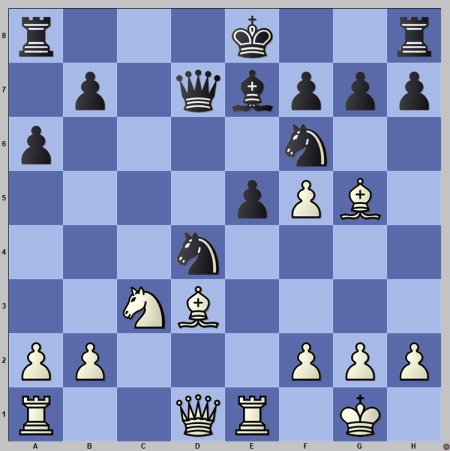
Radjabov’s opening strategy did not work out that well as White got some edge. To make things worse, at this point, Radjabov started to err. Giving up his pawn with 13…0-0-0 was part of his plan, but his decision to castle long instead of short meant that he was in trouble. His queenside fortress was weak, exposed to white bishops and in the very next move – 14.Rxe5 – Caruana had his rook join the front lines.
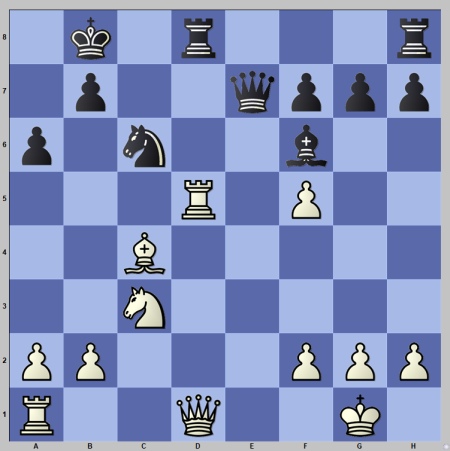
Im 18. Zug war die Einschätzung der Stellung klar: Caruana hatte einen Mehrbauern, aktivere Figuren und mehr Raum unter seiner Kontrolle. Allerdings spielte er hier etwas ungenau und stellte seine Dame auf d3 statt auf das bedrohlichere 18. Db3. Dies ermöglichte es Radjabov, seine Dame auf b4 zu stellen und sich einige Widerstandschancen zu verschaffen.
Im Laufe der Partie zeigte Caruana, dass er einen klareren Plan hatte – er positionierte seinen Läufer neu, um auf den schwarzen Damenflügel zu zielen, koordinierte seine Türme und aktivierte dann seinen König. Bei der Umsetzung dieses Plans beging Fabiano jedoch eine Ungenauigkeit und gab Schwarz die Chance, sich vom Haken zu befreien.
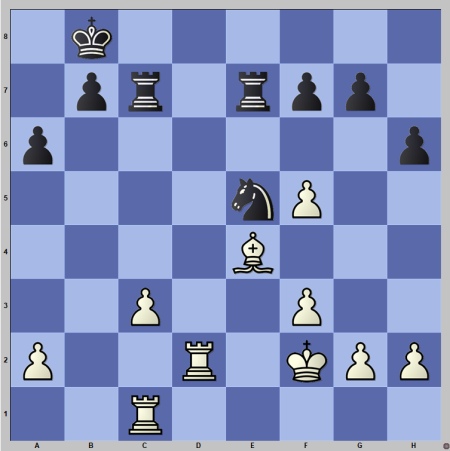
Hier hätte Schwarz seinen Springer mit 29…Sg4 nach f6 transferieren können! gefolgt von 30…Sf6, was seine Stellung mit guten Remisaussichten festigte. Radjabov spielte jedoch 29…f6? das Feld g6 schwächen und dem weißen König erlauben, später in das Lager von Schwarz einzudringen.
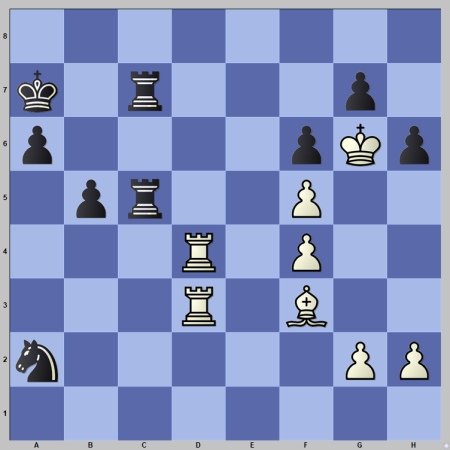
Schwarz klärte schließlich die weißen Bauern am Damenflügel, aber es half nichts, da Weiß am Königsflügel einfach schneller war. Ironischerweise beförderten die Gegner gleichzeitig die Damen, und Schwarz lieferte zuerst ein Schach, aber Caruana-Figuren dominierten das Brett, und nachdem die Damen getauscht wurden, erlosch der letzte Hoffnungsschimmer für Schwarz. Ein paar Schritte weiter warf Teimour das Handtuch.
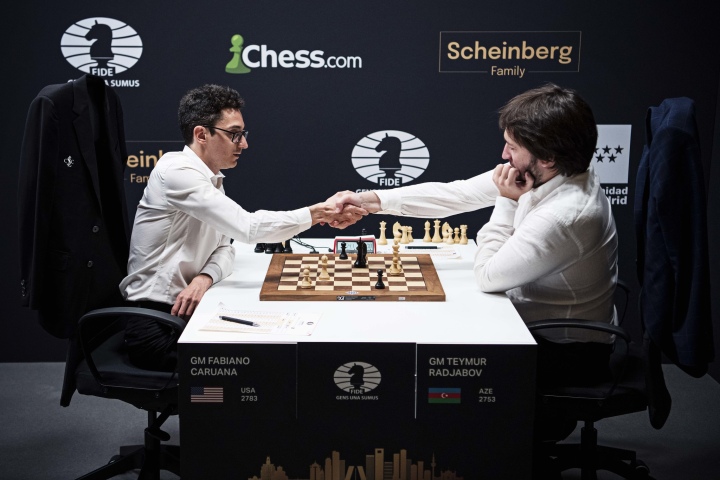
Die achte Runde der Kandidaten beginnt am Sonntag, den 26. Juni um 15:00 Uhr MESZ im Palacio de Santona in Madrid.
Die Paarungen der achten Runde sind wie folgt:
Richard Rapport gegen Jan-Krzysztof Duda
Ian Nepomniachtchi gegen Ding Liren
Hikaru Nakamura gegen Fabiano Caruana
Alireza Firouzja gegen Teimour Radjabov
Weitere Informationen finden Sie unter: https://candidates.fide.com/
Text: Milan Dinic
Fotos: FIDE / Stev Bonhage
Partner des Kandidatenturniers 2022:




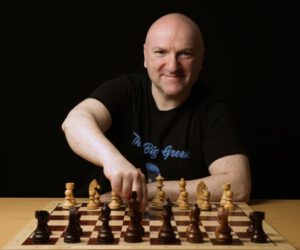


More Stories
Fair Play Team at the 45th Chess Olympiad in Budapest 2024
New Guinness World Records Title: Over seven million chess games played in one day!
Team lineups announced for record-breaking 45th Chess Olympiad in Budapest
From Paris and the world with chess: FIDE celebrates 100 years since its founding
Happy Internationaler Schach-Tag!
100 Jahre Förderung und Regieren des Schachspiels